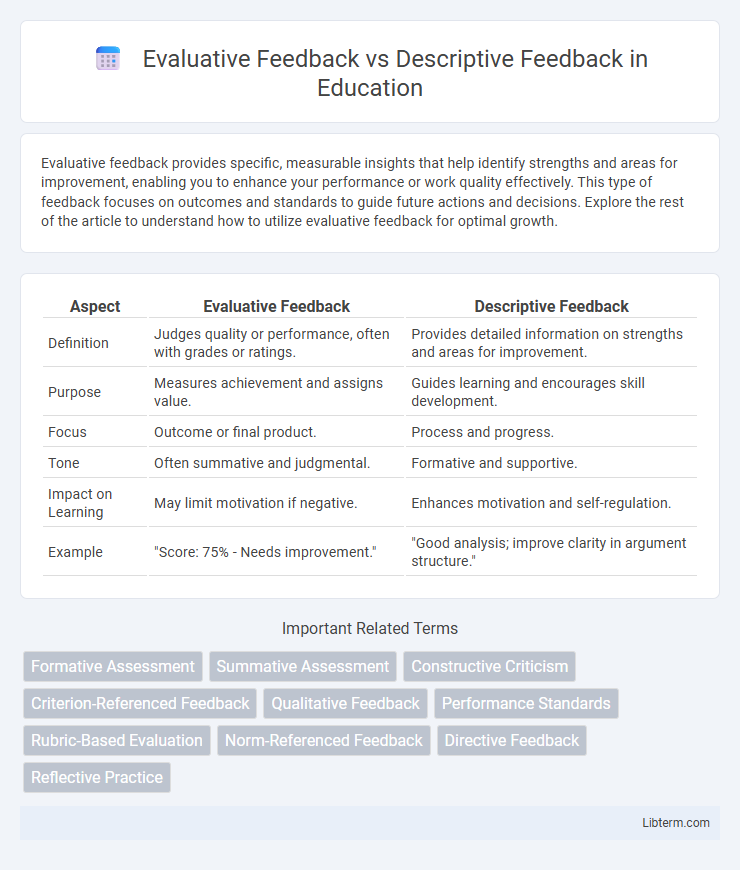Evaluative feedback provides specific, measurable insights that help identify strengths and areas for improvement, enabling you to enhance your performance or work quality effectively. This type of feedback focuses on outcomes and standards to guide future actions and decisions. Explore the rest of the article to understand how to utilize evaluative feedback for optimal growth.
Table of Comparison
| Aspect | Evaluative Feedback | Descriptive Feedback |
|---|---|---|
| Definition | Judges quality or performance, often with grades or ratings. | Provides detailed information on strengths and areas for improvement. |
| Purpose | Measures achievement and assigns value. | Guides learning and encourages skill development. |
| Focus | Outcome or final product. | Process and progress. |
| Tone | Often summative and judgmental. | Formative and supportive. |
| Impact on Learning | May limit motivation if negative. | Enhances motivation and self-regulation. |
| Example | "Score: 75% - Needs improvement." | "Good analysis; improve clarity in argument structure." |
Introduction to Feedback in Learning
Evaluative feedback provides a judgment about the learner's performance, often in the form of grades or scores, which can influence motivation and self-esteem. Descriptive feedback offers detailed information on specific aspects of the learner's task, guiding improvement by highlighting strengths and areas for development. In learning contexts, descriptive feedback is generally more effective for fostering skill acquisition and deeper understanding compared to evaluative feedback.
Defining Evaluative Feedback
Evaluative feedback provides judgment-based comments that classify performance as good or bad, often using scores or grades. It focuses on outcomes rather than specific behaviors or processes, offering limited guidance for improvement. This type of feedback is common in standardized testing and performance reviews where assessment is prioritized over developmental detail.
Understanding Descriptive Feedback
Descriptive feedback provides specific, clear information about a learner's performance, emphasizing strengths and areas for improvement without assigning a judgment or grade. It fosters deeper understanding and self-reflection by explaining what was done well and what needs to be refined, enhancing motivation and skill development. Unlike evaluative feedback, which typically offers summary judgments or scores, descriptive feedback guides learners through concrete, actionable insights that support ongoing learning and mastery.
Key Differences Between Evaluative and Descriptive Feedback
Evaluative feedback provides judgments or scores, often categorizing performance as good or bad, whereas descriptive feedback offers detailed information about specific strengths and areas for improvement. Evaluative feedback tends to be summative, aimed at rating overall performance, while descriptive feedback is formative, fostering learning and growth through actionable insights. Key differences include the purpose--assessment versus development--and the level of detail, with descriptive feedback emphasizing clarity, specificity, and constructive guidance.
Impact of Evaluative Feedback on Performance
Evaluative feedback, often characterized by judgmental comments and grades, can negatively impact performance by fostering anxiety and reducing intrinsic motivation. Studies show that learners receiving evaluative feedback are more likely to focus on proving competence rather than improving skills, leading to decreased persistence and creativity. In contrast, descriptive feedback promotes a growth mindset by providing specific, actionable information that directly supports skill development and enhances overall performance.
Benefits of Descriptive Feedback for Learners
Descriptive feedback offers specific, detailed insights that help learners understand their strengths and areas for improvement, promoting deeper self-awareness and skill development. This feedback type encourages active engagement by guiding learners through actionable steps and fostering intrinsic motivation. It supports long-term academic growth by creating a clearer connection between effort and outcome, enhancing both confidence and competence.
Examples of Evaluative vs Descriptive Feedback
Evaluative feedback typically includes judgments such as "Your presentation was excellent," which focus on the overall quality without specific details. Descriptive feedback provides concrete observations like "Your slides clearly highlighted key points, and your voice was steady throughout the presentation," helping recipients understand strengths and areas for improvement. Examples highlight that evaluative feedback centers on assessment, while descriptive feedback focuses on actionable information.
When to Use Evaluative or Descriptive Feedback
Evaluative feedback is most effective when a clear judgment or grade is required, such as in summative assessments or performance reviews where specific criteria must be met. Descriptive feedback should be used during formative assessments, providing detailed insights to guide improvement and learning by highlighting strengths and areas for development. Choosing between these feedback types depends on the goal: evaluative for decision-making and accountability, descriptive for growth and skill enhancement.
Best Practices for Providing Constructive Feedback
Providing constructive feedback involves using descriptive feedback to focus on specific behaviors and outcomes rather than evaluative judgments, which often lack actionable guidance. Best practices emphasize clear, objective language that highlights strengths and areas for improvement, fostering growth and motivation. Incorporating examples and suggestions enhances understanding and supports continuous development in educational or professional settings.
Conclusion: Maximizing Learning Through Effective Feedback
Evaluative feedback, which assigns judgments or grades, often limits learners' ability to reflect deeply and improve, whereas descriptive feedback provides specific, actionable information that guides skill development and fosters a growth mindset. Effective feedback maximizes learning by emphasizing detailed observations and constructive suggestions tailored to individual needs. Prioritizing descriptive feedback enhances motivation, promotes self-regulation, and leads to sustained academic achievement.
Evaluative Feedback Infographic

 libterm.com
libterm.com